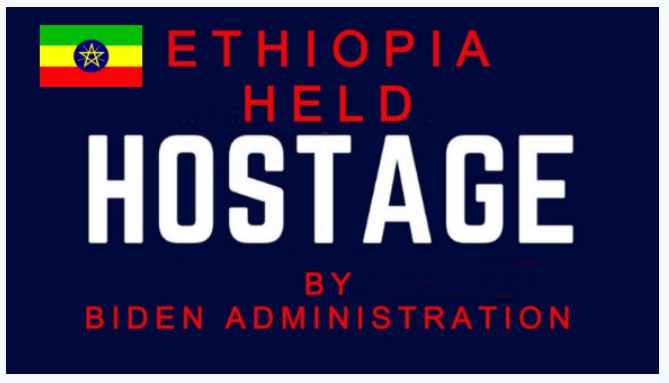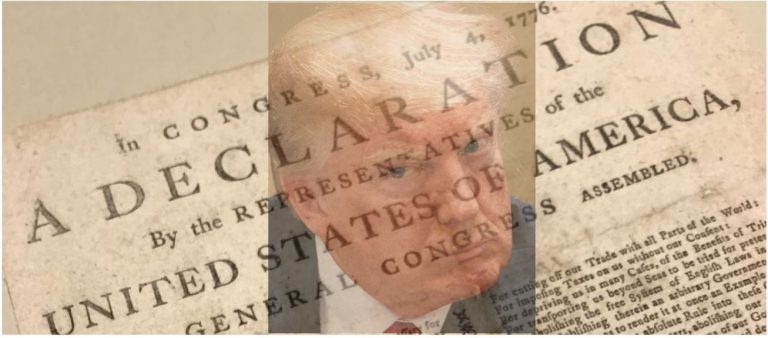Should Ethiopia Sue the United Kingdom in the International Court of Justice for the Terrorist Attack on Its Embassy in London?
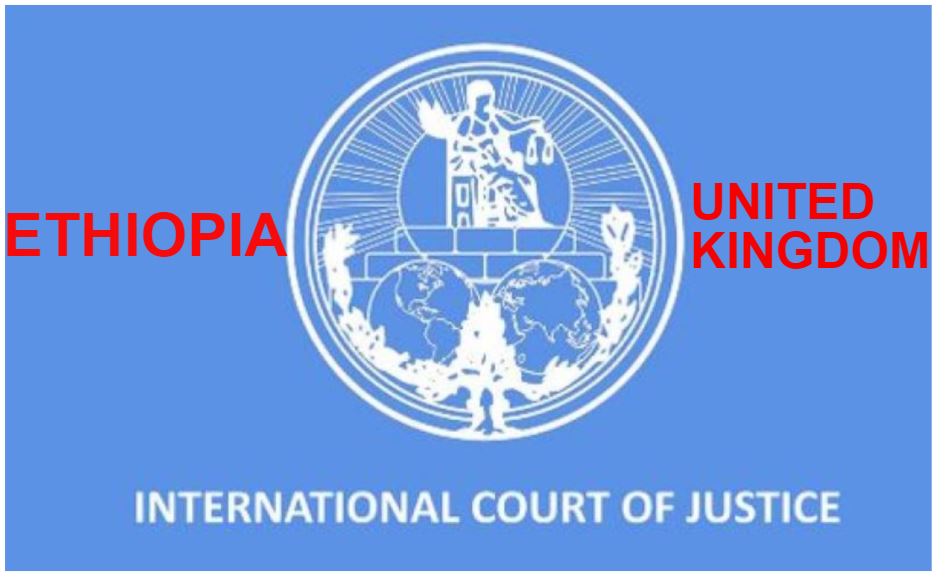 Author’s Note: Last week, a gang of thugs, hooligans and hoodlums launched a violent terrorist attack on the Embassy of Ethiopia in London in an apparent attempt to occupy the premises and quite possibly take hostages.
Author’s Note: Last week, a gang of thugs, hooligans and hoodlums launched a violent terrorist attack on the Embassy of Ethiopia in London in an apparent attempt to occupy the premises and quite possibly take hostages.
The terrorist attack on the Ethiopian Embassy could easily have become a repeat of the Iranian Embassy siege that took place in London in May 1980 when a group of armed terrorists stormed the Iranian Embassy and took hostage over 26 embassy staff and visitors. A year earlier in Tehran, Iran, so-called students seized the U.S. Embassy and took 50 American diplomats and staff hostage for 444 days. On September 11, 2012, the U.S. Consulate in Benghazi, Libya was attacked by an “armed angry mob” resulting in the death of the U.S. ambassador.
This threat of embassy sieges and takeovers by terrorist groups should not be underestimated nor discounted. Neither should such attacks be euphemistically dismissed as “the actions of angry mobs”. Terrorists are angry mobs willing to kill innocent people and wantonly destroy property for their political ends.
In the London attack on the Ethiopian Embassy, ethnonationalists groups in the Ethiopian diaspora with their counterparts in Ethiopia manipulated unemployed, vagrant and refugee youth in London to do their dirty deeds. Just like Al Qaeda, Al Shabaab and ISIS recruit impoverished, jobless and refugee youth to commit terrorist acts.
There is another clear and present danger posed by these ethnonationalists. They do not plan to make London their last stop. They plan to undertake sieges and attacks on Ethiopian Embassies at critical locations including Washington, D.C. in the coming weeks.
Such attacks must be characterized as terrorist attacks, not as “actions by angry mobs”. Host countries have a legal obligation to gather intelligence on such terrorist groups and take preemptive action and vigorously prosecute suspects as they are required to do under international law.
Regrettably, the UK Government has spectacularly failed in its international obligations to protect the Embassy of Ethiopia.
Following a formal protest by the Government of Ethiopia, “The UK government has now assured the Ethiopian government that measures have been taken to guarantee the safety and security of the Embassy under the UK’s obligations as per the Vienna Convention on Diplomatic Relations.”
The fact that the UK Government must issue such an assurance is utterly appalling to me.
Did the UK Government need a formal complaint from the Ethiopian Government to remind it of its international obligation under the Vienna Convention?
Is the UK Government so ignorant of its international obligations that a formal diplomatic complaint must be registered before it can take action?
Precisely because the UK Government is so nonchalant and manifestly indifferent to its solemn international obligations, diplomatic assurances should not be regarded as sufficient.
To underscore the gravity of the breach of international obligation, I believe the Government of Ethiopia should serve formal notice on the UK Government that it will institute proceedings in the International Court of Justice should another terrorist attack be attempted or committed on its Embassy in London.
Indeed, I would urge the Government of Ethiopia to proactively give notice to all countries where it maintains diplomatic missions of their obligation to protect Ethiopia’s diplomatic agents, staff and premises against foreseeable terrorist attacks.
While I appreciate the promises of the Government of the United Kingdom to prevent future incidents, there is one big question that has not been answered: Will the UK Government prosecute the offenders and under what laws will the charges be made? Is the UK Government prepared to charge the persons involved in the Ethiopian Embassy attack on terrorism charges?
Let there be no mistake.
Strictly from the legal perspective, the video documented fact of the group attacking the Ethiopian Embassy, climbing the portico and pulling down the Ethiopian flag and raising the flag of a terrorist group listed in the Global Terrorism Database is prima facie evidence of a terrorist attack. No additional evidence is required to establish probable cause for terrorism charges.
A terrorist attack on the Embassy of Ethiopia and its diplomatic agents in London
Under the British Terrorism Act of 2000, terrorism is defined as “the use or threat is designed to influence the government or an international governmental organisation or to intimidate the public or a section of the public, and the use or threat is made for the purpose of advancing a political, religious, racial or ideological cause.
Last week, a gang of thugs, hooligans and hoodlums in broad daylight attempted a physical takeover of the Embassy of Ethiopia in London for the “purpose of advancing their ethnic political cause.”
The attack took place as the famed London Police (Bobbies) looked on with arms folded. The Bobbies looked helpless and clueless as the terrorists pushed and shoved them and in some cases engaged them in hand to hand combat. London police did nothing as the terrorist thugs climbed the embassy portico and pulled down the Ethiopian flag and raised the flag of a terrorist group listed in the Global Terrorism Database.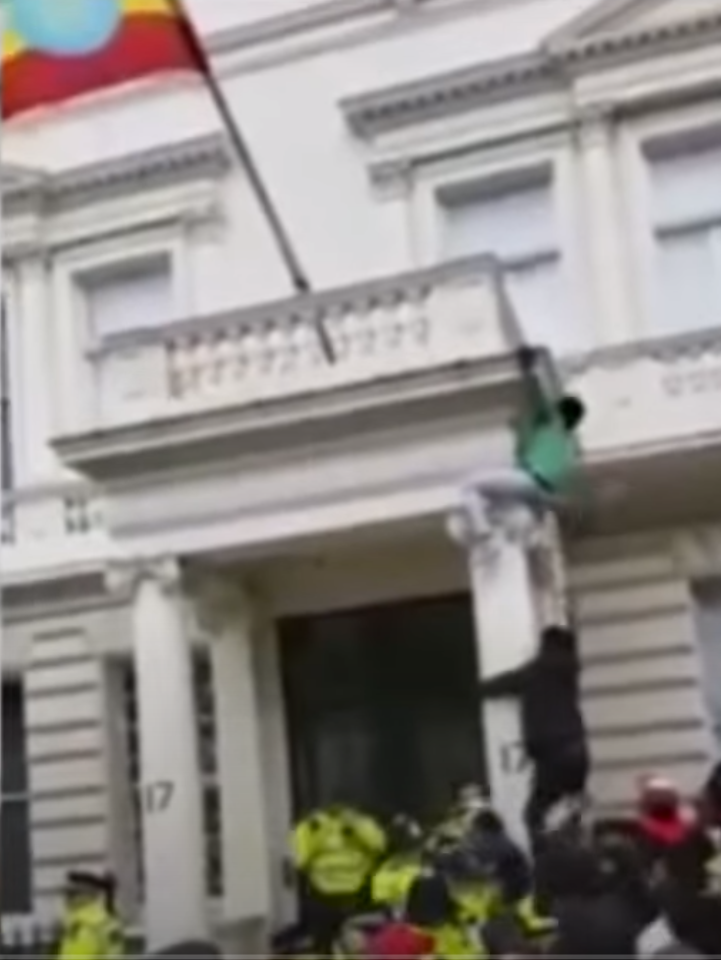
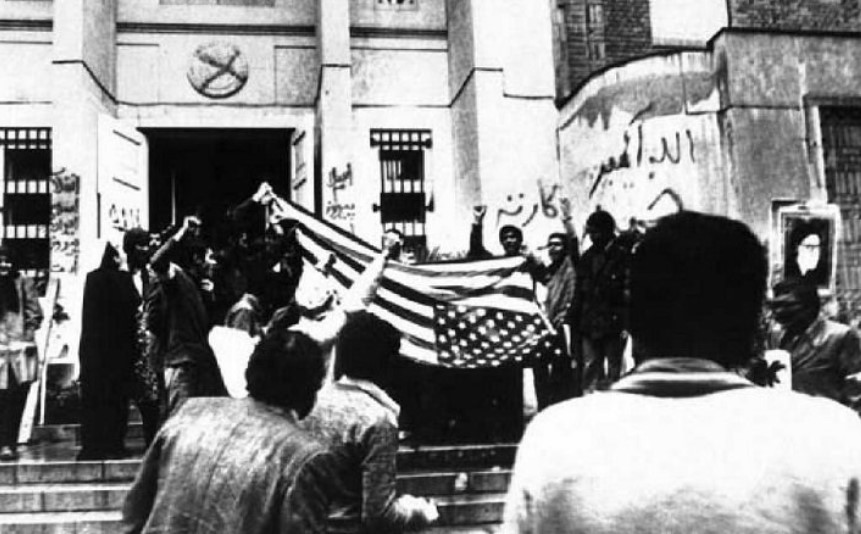
According to one report, “A mob of radical ethnic Oromo nationalist took down the Ethiopian flag at the Ethiopian Embassy in London and replaced it with the flag Oromo Liberation Front (OLF).”
The report citing a statement by the Ethiopian Embassy in London stated, “a group of angry and violent protesters committed an unprovoked physical assault on one of our staff members and prevented customers from obtaining the embassy’s service.” It was further reported that “the group was camping in the parking lot of the embassy hassling embassy staff and disrupting service delivery.” Investigation has yet to confirm if the group was armed.
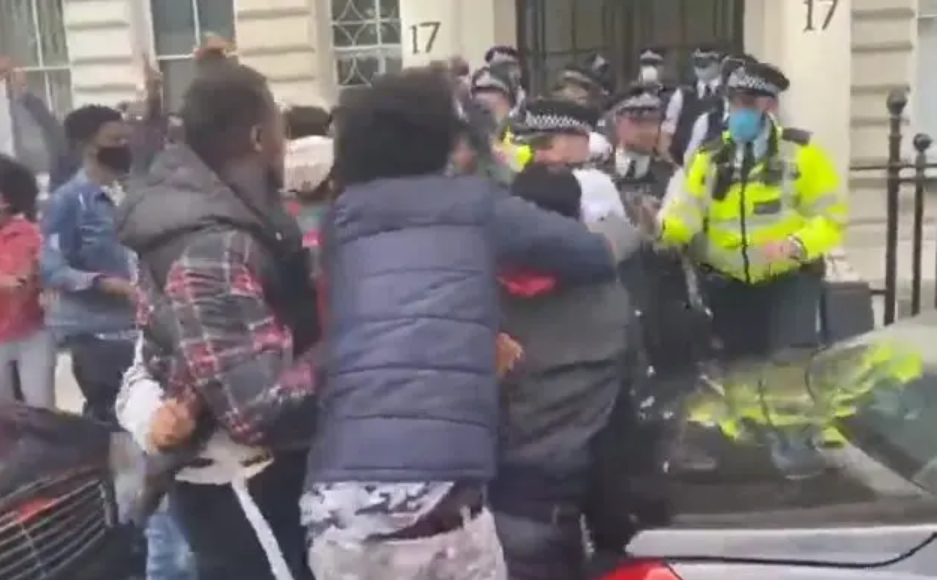
Attack on Ethiopian Embassy in London.
What is mind boggling is the fact that London Police did absolutely nothing to prevent the attack nor did they take immediate action to neutralize the attack once it started. Rather, they allow the mob to tussle with them and climb on the embassy roof without taking any action.
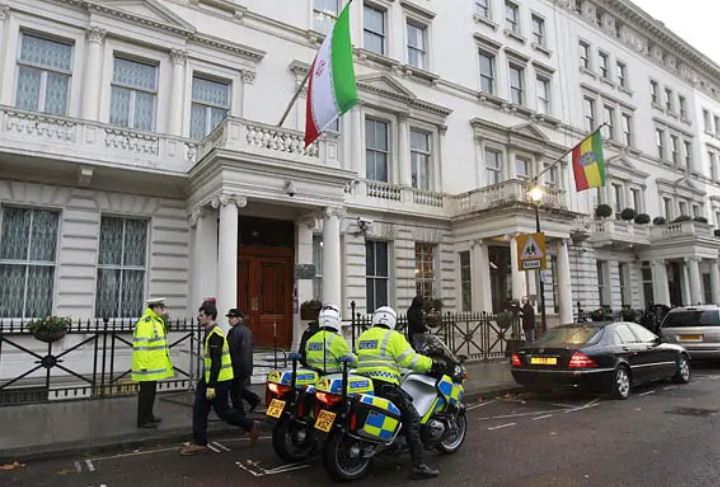
The manifest aim of the ethnonationalist terrorists was to repeat the Iranian hostage taking of 1979. See video here.
The legal basis for Ethiopia to sue the UK in the Permanent International Court of Justice
The International Court of Justice established by the Charter of the United Nations as the principal judicial organ of the United Nations (UN Charter Arts. 92-96). “All Members of the United Nations are ipso facto parties to the Statute of the International Court of Justice.” (Art. 93.)
In 2017, I had an opportunity to visit the International Court of Justice in The Hague.
Article 36, paragraph 1, of the Statute provides that the jurisdiction of the Court comprises all matters specially provided for in treaties and conventions in force. Such matters are normally brought before the Court in a ex parte (unilateral) proceedings setting forth allegations (Statute, Art. 40, para. 1).
Article 22 of the Vienna Convention on Diplomatic Relations (1961) provides:
1. The premises of the [diplomatic] mission shall be inviolable. The agents of the receiving State may not enter them, except with the consent of the head of the mission. 2.The receiving State is under a special duty to take all appropriate steps to protect the premises of the mission against any intrusion or damage and to prevent any disturbance of the peace of the mission or impairment of its dignity.
Ethiopia became part of the Convention by accession (after treaty entered into force) on March 22, 1979. Britain signed the Convention on December 11, 1961.
Ethiopia (April 16, 2003) and the United Kingdom (May 2, 1979) are signatories to the Convention on the Prevention and Punishment of Crimes against Internationally Protected Persons, including Diplomatic Agents.
Under Article 2 of the “Convention on Prevention”, a violent attack upon the person or liberty of an internationally protected person or their official premises or private accommodation or threats or attempt to commit such an attack are subject to mandatory prosecution in the state where the offense occurred.
Under Article 5 of the “Convention on Prevention”, a State whose diplomatic agents have been a victim of crime are entitled to “all the pertinent facts regarding the crime committed and all available information regarding the identity of the alleged offender fully and promptly.”
Under Article 7 of the “Convention on Prevention”, the country where the alleged offender “is present shall, if it does not extradite him, submit, without exception whatsoever and without undue delay, the case to its competent authorities for the purpose of prosecution, through proceedings in accordance with the laws of that State.”
Under Article 8 (2), Ethiopia has the right under the “Convention on Prevention” to request extradition of the alleged offenders even if it does not have an extradition treaty with the United Kingdom.
Credible legal claims Ethiopia can make against the United Kingdom
I believe Ethiopia can make a credible case against the UK Government in a number of ways:
Pursuant to Article 22 of the Vienna Convention, the UK Government is under an international legal obligation to Ethiopia to ensure Ethiopian diplomatic premises in the United Kingdom “shall be inviolable”. The UK Government has violated this obligation by the depraved indifference of its law enforcement authorities during the violent attack on the Ethiopian Embassy by terrorists.
Pursuant to Article 29 of the Vienna Convention, the government of the United Kingdom is under an international legal obligation to Ethiopia to ensure that the persons of Ethiopian diplomatic agents be kept inviolate from “any form of arrest or detention” and that every such diplomatic agent shall be treated “with due respect” and protected from “any attack on his person, freedom, or dignity”. The UK Government has flagrantly violated Article 29 by the depraved indifference of its law enforcement authorities during the violent attack of the Ethiopian Embassy in which Ethiopian Embassy personnel were forced to remain in their premises fearing for their lives, disrespected by London Police who did nothing in callous disregard for the well-being of Ethiopian Embassy personnel and took no action to defend the person, freedom or dignity of these personnel
Pursuant to Article 4 of the Convention on Prevention, the UK Government is under an international legal obligation to Ethiopia to cooperate in the prevention of crimes against the official premises and the staff of the Ethiopian Embassy, including an obligation to take all practicable measures to prevent preparations. The UK Government has failed in its obligation under Article 4.
Pursuant to Article 7 of the Convention on Prevention, the UK Government is under an international legal obligation to Ethiopia to submit to competent Ethiopian authorities for the purpose of prosecution all persons engaged in committing crimes against the official premises and the staff of the Embassy of Ethiopia in London. The Government of the United Kingdom has violated and continues to violate this obligation by failing to take appropriate legal action and informing the Government of Ethiopia of its actions.
The UK Government has allowed and continues to allow within its jurisdiction persons engaged in a criminal conspiracy to attack protected diplomatic agents of Ethiopia and the official Embassy of Ethiopia with the intent to force, blackmail or otherwise unlawfully pressure the Government of Ethiopia to take action which it is under no obligation to undertake.
The UK Government is under an international legal obligation to Ethiopia under customary international law to ensure the protection of the diplomats and staff of the Embassy of Ethiopia in London, the inviolability of its Embassy and any other diplomatic premises. The UK Government has failed in its obligations under customary international law.
By failing to uphold its obligations under the Vienna Convention and the Convention on Prevention, the Government of the United Kingdom has violated obligations under the Charter of the United Nations, particularly Article 2, paragraphs 1, 2, 4, 5.)
In summary, I believe the UK Government through its depraved indifference to the safety and security of the diplomatic agents and staff of Ethiopia in London and by failing to prevent and take prompt action to prosecute the offenders has violated its international legal obligations to Ethiopia as provided by :
Articles 22, 25, and 29 of the Vienna Convention on Diplomatic Relations.
Articles 28, 3 1, 33, 34, 36 and 40 of the Vienna Convention on Consular Relations.
Articles 4 and 7 of the Convention on the Prevention and Punishment of Crimes against Internationally Protected Persons, including Diplomatic Agents, and
Articles 2 (1), 2 (2), and 2 (4) of the Charter of the United Nations.
I confess I have special regard and affection for British law
I cut my “legal teeth” four decades ago pouring over the Magna Carta, Blackstone’s “Commentaries” and Edward Coke’s legal treatises on the primacy of common law principles and the rule of law. (I wonder how many legal scholars, let alone common folks, actually pay any attention to these great legal sources today.)
Coke enunciated the most important legal principle of all time — judicial review — in Bonham’s Case declaring, “when an act of parliament is against common right or reason, or repugnant, or impossible to be performed, the common law will control it and adjudge such act to be void.”
Blackstone later described the power of Parliament to make laws in England as absolute and without control.
Judicial review today is the linchpin of American democracy and without it Donald Trump would be Emperor Donald Trump.
For nearly three decades, I have taught my course on civil liberties and free speech by requiring my students to read John Milton’s tract Areopagitica, “for the Liberty of Unlicenc’d Printing, to the Parliament of England”, arguably the most influential and impassioned philosophical defences of the principle of a right to freedom of speech and expression.
More recently, I took great pride in celebrating the 800th anniversary of the Magna Carta on my campus with my students (arguably the only celebration of its kind on any American campus in 2015). It was a special honor to have my commentary, “A Magna Carta for Ethiopia” posted on the official website of the British 800th Magna Carta Committee.
I have always had the highest regard for British jurisprudence in the historical context even though I have not had the opportunity to study contemporary English law.
Oh, Perfidious Albion!
On July 2, 2020, a gang of thugs and hooligans and criminals destroyed a statue of the late Ethiopian leader Haile Selassie in a park in Wimbledon, south-west London. An eyewitness stated he saw a “mostly male group in the park, carrying fliers with Oromo slogans.” Apparently, nothing was done by the UK Government except empty “assurances” it will investigate.
In 2017, the UK Government charged Prof. Tadesse Biru Kersmo with 8 counts of “possession [in his laptop] of articles containing information of a kind likely to be useful to a person committing or preparing an act of terrorism” and “ one count of attendance at a place used for terrorist training contrary to section 8 of the Terrorism Act 2006.”
Prof. Tadesse was a member of Ginbot 7, an opposition group with members not only in the U.K. but also in the U.S. and other European countries and not listed in the U.K. Proscribed Terrorist Organizations List. He taught at the International Leadership Institute, affiliated with the University of Greenwich in London.
In my July 24, 2017 commentary I argued no British jury would convict Prof. Tadesse because there are “a thousand doubts based on reason and facts as to his guilt.” I knew no reasonable British jury would find a man guilty of terrorism simply for downloading on his computer freely available or easily purchasable documents on the internet. On December 19, 2017, a British jury took only 2 hours to acquit Prof. Kersmo on all charges just like I predicted.
The supreme irony in Prof. Tadesse’s prosecution was that while the UK Government was prosecuting Prof. Tadesse on terrorism charges it lay in bed with the Tigrean Peoples Liberation Front (TPLF), a terrorist organization listed in the Global Terrorism Database. The same TPLF in 2014, in an act of state-sponsored terrorism, abducted Andaragatchew Tsgie, the General Secretary of Ginbot 7 in Yemen in violation of international law, and held him without trial until 2018 when he was released by PM Abiy Ahmed.
The UK Government now has a genuine terrorism case on its hands that fits the definition of the Terrorism Act of 2000 to a “T”.
Will the UK Government have the guts, the moxie, to charge the terrorist hoodlums that attacked the Embassy of Ethiopia last week?
Just like I predicted the outcome of the trial in Prof. Tadesse trial, I shall predict the UK Government does not have the courage or the commitment to the rule of law to pursue the terrorists in its midst!
The UK Government would rather prosecute an academic for his pro-democracy activism than real terrorist that attempted a takeover and siege of an embassy.
“Perfidious Albion” is a phrase used to describe British diplomatic hypocrisy and treachery.
If a terrorist attack had been launched on the British Embassy in Ethiopia, the UK Government would have screamed bloody murder and raked the Ethiopian Government over the diplomatic coals.
The UK Government would not have been satisfied with verbal assurances of future protections. The UK Government would have demanded the Ethiopian Government hang, draw and quarter the suspects immediately.
But an “assurance” is sufficient for a poor African country!
Legend has it that Winston Churchill once remarked, “Diplomacy is the ability to tell someone to go to hell in such a way that they look forward to the trip.”
I wonder if the UK Government’s “assurance that measures have been taken to guarantee the safety and security of the Ethiopian Embassy” is merely Churchillian diplomacy in action.




